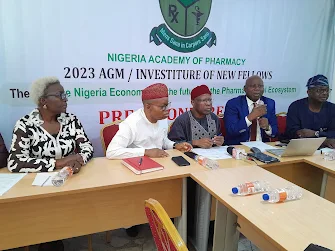Create Viable Environment For Pharmaceutical Industries To Trigger Sustainable Development - NAPHARM Urges FG
•••Says It'll Induct 14 Industry Leaders From Nigeria, Diaspora At Its Ninth
The Nigeria Academy of Pharmacy (NAPHARM) has urged the Federal Government to create policies that promote a viable environment for the pharmaceutical industries to improve healthcare delivery and contribute more to sustainable economic development.
Prince Paul Osogbe Enebeli, Chairman, Annual General Meeting (AGM)/Investiture Committee, Nigeria Academy of Pharmacy (NAPHARM) said this at a press conference ahead of the Investiture of the 14 new Fellows and ninth AGM on Friday, in Lagos.
Enebeli further said that NAPHARM is ready to induct 14 leading industry players from Nigeria and Diaspora into its hallowed ranks on Thursday, September 7, 2023.
He noted that the NAPHARM's foundational members in 2014 were 41 Fellows, and has now progressively grown to 105 by the end of last year. The Investiture of 14 new Fellows will bring the aggregate to 119.
According to him, 14 inductees are drawn from various pharmaceutical groups in Nigeria and the Diaspora. "Ten of the 119 Fellows are Life Fellows. We also have three Honorary Awardees and three." Some of the more notable prospective inductees include; Pharm. (Prince) Julius Adelusi-Adeluyi, Pharm. (Sir) Ifeanyi Atueyi, Pharm. (Dr.) Evans C. Chidomere, Pharm. (Dr, Sir) Gabriel Lambert Eradiri and Pharm. Bruno Nwankwo.
Others are, Pharm. Godfrey Obiaga, Pharm. (Dr) Stella Okoli, Pharm. (Prof.) Philip Olurinola, Pharm. (Prof.) 'Fola Tayo and Pharm. (Prof.) Oleka Udeala.
Enebeli insisted that Nigeria must address sector challenges by leveraging opportunities therein to strengthen its pharmaceutical ecosystem, improve healthcare delivery, and contribute more to sustainable economic development.
He also decried the over N33 billion debt some of the 52 Federal Health Institutions (FHIs), that is government-owned teaching hospitals, are owing pharmaceutical companies under the Drug Revolving Fund (DRF).
He said: “The Nigeria Academy of Pharmacy has carefully chosen this year’s theme, ‘The Nigerian Economy and the Future of the Pharmaceutical Ecosystem.’ This theme is now more relevant as we increasingly face the challenges of insecurity, the removal of fuel subsidies, exchange rate reforms, etc which continue to impact negatively on the business environment."
He noted that the country’s large population, increasing healthcare spending, emphasis on local manufacturing, regulatory reforms, innovation, and regional integration provide a strong foundation for growth in the sector.
Enebeli said the burden of unpaid DRF debt owed by teaching hospitals should be resolved, stressing the need for a vibrant pharmaceutical industry, which will thrive when government gives adequate attention.
Dr. Lolu Ojo, Director of Programmes, said the government is their greatest debtor and for the industry to thrive, there must be patronage, especially by the government.
“As I speak to you now, government-owned hospitals are owing some of our members more than N33 billion for drugs purchased under the DRF. There should not be any reason for this debt except the corrupt tendencies by those heading those hospitals. Some of them divert monies for DRF that ensure there are enough drugs in the hospitals into other ventures. We have taken the case to the Federal Ministry of Health, the Senate, the House of Representatives and even State Governors,” he said.
To address the situation, Ojo said the government should do forensic audits in most teaching hospitals. On the agenda for the new health ministers, Prof. Mohammed Ali Pate, Secretary General, NAP, and Vice-Chancellor, Business School The Netherlands, Prof. Lere Baale, said canvasses the revitalisation of Primary Health Care (PHC) using the community pharmacists for routine immunisation. “Another thing is the health insurance scheme, which needs revitalisation. We think it is something that should be handled in the States.
“Digitisation of health care is important. So, it is possible for people to reach out to professionals using text, call etc. There should also be training and retraining for healthcare workers. The issue of disease surveillance and control should be entrenched.
“There is no government in the world that has successfully managed healthcare. The government needs to partner with hospital pharmacists on DRF and community pharmacists for routine immunisation.”
Enebeli noted that since its inauguration in 2014, the NAP (NApharm) has emerged as a leading force in advancing pharmaceutical practice and promoting excellence within the industry.





